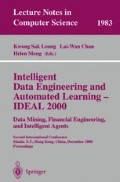Abstract
In human-computer interaction, user interface events can be recorded and organized into sequences of episodes. By computing their implication networks, episode frequencies, and some heuristic measures of interestingness, we can readily derive some application-specific episode association rules. In order to demonstrate the proposal method, we have developed a personalized interface agent that can take into consideration interface events in analyzing user goals. It can then delegate on behalf of the user to interact with the software based on the recognized plans. In order to adapt to different users’ needs, the agent can personalize its assistance by learning user profiles. Currently, we have used the Microsoft Word as a test case. By detecting and analyzing the patterns of user behavior in using Word, the agent can automatically assist the users in certain Word tasks. The pattern association can be achieved at several levels, i.e., text-level (phrase association), paragraphlevel (formatting association), and document-level (style and source association).
Access this chapter
Tax calculation will be finalised at checkout
Purchases are for personal use only
Preview
Unable to display preview. Download preview PDF.
References
Henry Lieberman. Letizia: An agent that assists web browsing. 1995. http://lieber.www.media.mit.edu/people/lieber/Lieberary/Letizia/Letizia-AAI/Letizia.html
Adriana Vivacqua, Henry Lieberman, Neil Van Dyke. Let’s browse: A collaborative web browsing agent. 1997. http://lieber.www.media.mit.edu/people/lieber/Lieberary/Lets-Browse/Lets-Browse.html
A. Inkeri Verkamo Heikki Mannila, Hannu Toivonen. Discovery of frequent episodes in event sequences. 1997.
Heikki Mannila, Hannu Toivonen. Discovering generalized episodes using minimal occurrences. 1997.
Jiming Liu, Michel C. Desmarais. A method of learning implication networks from empirical data: algorithm and Monte-Carlo simulation-based validation. 1997.
Michel C. Desmarais, D. A. Maluf, and Jiming Liu, User-expertise modeling with empirically derived probabilistic implication networks. In the International Journal of User Modeling and User-Adapted Interaction, vol. 5, no. 3–4, pp. 283–315, 1996.
Dunja Mladeic, Marko Grobelnik. Feature selection for classification based on text hierarchy. 1999.
Dunja Mladeic, Marko Grobelnik. Feature selection for unbalanced class distribution and naive bayes. 1999.
Dunja Mladeic, Marko Grobelnik. Word sequences as features in text-learning. 1999.
Dunja Mladeic, Marko Grobelnik. Assigning keywords to documents using machine learning. 1999.
Thorsten Joachims. A probabilistic analysis of the Rocchio algorithm. 1996.
Author information
Authors and Affiliations
Editor information
Editors and Affiliations
Rights and permissions
Copyright information
© 2000 Springer-Verlag Berlin Heidelberg
About this paper
Cite this paper
Liu, J., Wong, K.C.K., Hui, K.K. (2000). Discovering User Behavior Patterns in Personalized Interface Agents. In: Leung, K.S., Chan, LW., Meng, H. (eds) Intelligent Data Engineering and Automated Learning — IDEAL 2000. Data Mining, Financial Engineering, and Intelligent Agents. IDEAL 2000. Lecture Notes in Computer Science, vol 1983. Springer, Berlin, Heidelberg. https://doi.org/10.1007/3-540-44491-2_58
Download citation
DOI: https://doi.org/10.1007/3-540-44491-2_58
Published:
Publisher Name: Springer, Berlin, Heidelberg
Print ISBN: 978-3-540-41450-6
Online ISBN: 978-3-540-44491-6
eBook Packages: Springer Book Archive

